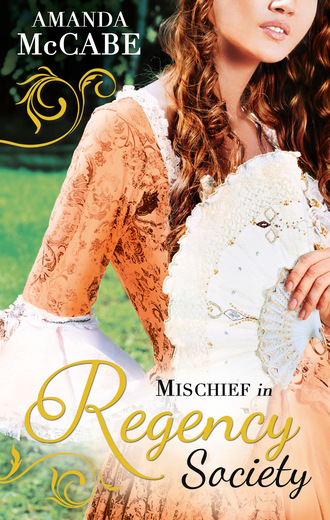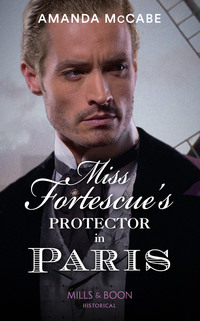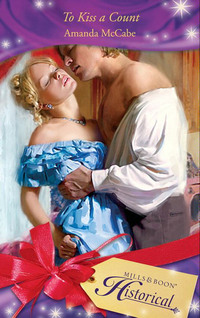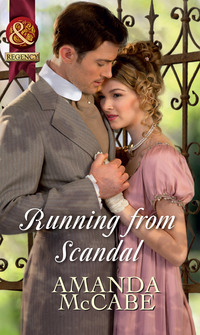
Полная версия
Mischief in Regency Society
“Yes, probably from the duke’s masquerade ball, as we discussed at our last meeting,” Calliope answered. “We must formulate a plan to prevent it.”
“I am ready to defend her at any moment!” Thalia cried. She leaped up from her chair, eyes aglow as she no doubt imagined herself wielding a sword against any would-be thief. “Only give me the signal and I shall do battle.”
“Thalia, dear, do sit down,” Clio said, shaking her head. “We don’t need Boadicea and the Iceni hordes to keep an eye on one little statue.”
“You never know,” Thalia said, plopping back into her seat. “What if the Lily Thief has a partner? An army?”
“Even if he had a battalion—which he does not, for how could a battalion sneak into Lady Tenbray’s library?—he could not get by us,” Calliope said.
“What is the plan?” asked Emmeline. “What are we to do?”
“I made up a list of anyone who might even remotely be suspected of being the Lily Thief,” Calliope said, holding up her list from last night’s sleepless hours. “Everyone in the ton received an invitation to the ball, so they are sure to be there. You will each be assigned one or two names. Your task will be to ascertain what each man’s costume is, and then keep an eye on them, make certain they do not try to slip away.”
“I hope you do not want me to trail Freddie Mountbank,” Emmeline said. “He’s already made himself a nuisance in my life!”
“Mr Mountbank is not even on the list,” Calliope answered, remembering the quarrel Mountbank got into with Lord Westwood right in view of these very windows. “And we must not be at all obvious about our observations. We wouldn’t want to give the wrong idea.”
“Perhaps we should work in pairs,” Lotty suggested. “That would make it easier for us to trail anyone who might try to slip away.”
“Oh, very good idea, Lotty,” Calliope said. She reached for Clio’s pen and quickly made the amendments to the list. “All right, then, ladies, here are your assignments.”
Thalia handed out the papers to the Society members. They bent over them eagerly, laughing and exclaiming.
“Mr Emerson!” Lotty said. “It would certainly be no hardship to watch him. He is so handsome.”
“Nor Lord Mallow,” said Emmeline. “But what of Mr Hanson? I wouldn’t have thought he could plot a stroll to the end of the street, let alone a theft.”
Calliope rapped her gavel against the table, bringing order back to the gathering. “Now that you have your assignments, this is how we shall proceed on the night of the ball…”
“Do you think it will work?” Emmeline asked quietly, coming up next to Calliope, who stood staring out the window.
Calliope glanced back at the others, gathered around the pianoforte as Thalia played them a Beethoven nocturne. “I don’t know,” she answered honestly. “The ball is sure to be a dreadful crush. How can we watch just a few people? People in disguise, no less. Yet I can’t just stand here and let that statue be stolen without at least trying to do something.”
“I know. We all care so very much, we want to save them all. Make sure they are all properly looked after and studied,” Emmeline said. “There are only five of us, though. But we will do our very best to save the Alabaster Goddess, Calliope, never fear. She never had more devoted acolytes, even in her temple in Greece.”
They were quiet for a moment, listening to Thalia’s beautiful music, watching the traffic on the street below. Emmeline leaned closer to murmur, “Did you assign yourself Lord Westwood to watch, Calliope?”
Calliope looked to her, startled. “I thought Clio could do that.”
“Oh, no, I really think it should be you. The two of you are always circling each other like wary hawks anyway.”
“We do not!” Calliope cried. The others glanced towards them, and she hastily lowered her voice. “I do not circle Lord Westwood, Emmeline. Whatever do you mean?”
“Oh, Calliope dear. Everyone sees it. Whenever you are in a room together smoke practically billows. My brother even tells me you are in the books at his club.”
“The books! People are wagering on me?” Calliope felt a sick, sour pang deep in her stomach, an ache of sinking embarrassment. “How dare they! What—what are they saying?”
“Are you sure you want to know?” Emmeline said, her eyes full of concern. “I should never have brought it up.”
“Of course you should. If people are talking about me, I want to know.”
“Well, half of them wager you will be married by the end of the Season. The other half wagers one of you will be in Newgate for murdering the other.”
Calliope pressed her hand against her stomach. “What does your brother wager?”
“Calliope! He would never do that to a friend.”
“Come now, Emmeline. He is a man. Wagering seems to be in their very veins. They cannot help themselves.”
“Well, if he does he doesn’t tell me about it. I was much too angry with him for not putting a stop to it.”
“People are always full of such tittle-tattle. They must be desperate for gossip indeed to make up Banbury tales about such a dullard as me! Where do they find that kind of nonsense?”
Emmeline eyed her closely. “It is not entirely made of whole cloth, you know. You and Lord Westwood snap and quarrel every time you meet, or if you don’t speak you glower at each other from across the room. What are people to think?”
Calliope now felt ill in earnest. She sat down heavily in the nearest chair, wrapping her arms tightly around herself.
“Calliope, dear, you really didn’t know?” Emmeline asked.
“I have been so engrossed in my own studies,” Calliope murmured. “Worrying about the Lily Thief. I suppose I was just oblivious. My mother always did say that living in my own little world would get me into trouble one day.”
“It is hardly trouble,” Emmeline said. “It’s not as if you were caught kissing him! You’re right, it’s just silly gossip from people who have nothing better to do. It will soon be gone, replaced by something else and forgotten. My brother says they also wager on whether or not Prinny is the Lily Thief, so you see how serious their betting books are!”
Calliope laughed reluctantly. The vision of the prince, fat, red-faced and encased in a creaking corset climbing in windows and picking locks was so absurd it nearly drove out those sick feelings.
“Just ignore them, Calliope,” Emmeline said. “Their ignorance deserves no response. In the meantime, why don’t we go for a stroll in the park? It is too fine a day to stay indoors, and we all need time to think over our plan for the ball.”
“I would like some fresh air,” Calliope admitted.
“Excellent! I will tell the others.”
Calliope caught Emmeline’s arm as she turned away, staying her for a moment. “Emmeline, what do you think of Lord Westwood and me?”
Emmeline gave her a gentle smile. “How can I say? I’m just an unmarried lady like you, with Freddie Mountbank my most serious suitor. I know little of romance. You say you dislike him. Very well. But are you sure that’s all there is to the matter? Maybe you should ask Lotty what would happen in one of her novels.”
Calliope watched Emmeline walk away, more confused than ever. Antiquities she knew about; they could be studied, classified. Men never could. Especially Westwood.
Maybe she really should take up reading horrid novels, and not so much Aristotle and Thucydides. It was obvious that her powers of observation, her knowledge of modern life, of what passed for romance, was sadly lacking. Would The Prince’s Tragic Secret fill that gap? Surely everything could be learned, with the right tools. Herodotus was no help here. Perhaps By An Anonymous Lady could be.
Calliope pushed herself up from her chair and made her way resolutely towards her friends, who were gathering up their shawls and bonnets in preparation for their walk.
“Lotty,” she called. “Could I speak to you for a moment?”
As it was a fair day, cool and dry after the morning’s rains ceased, Hyde Park was quite crowded. Riders cantered along Rotten Row, stopping by the barriers to chat with each other, or with friends who rolled past in their open carriages, showing off their newest fashions. Nannies in starched caps and cloaks watched their charges as they sailed tiny boats on the calm, murky waters of the Serpentine or rolled hoops along the gravel pathways.
Calliope smiled as she watched them, their laughing faces turned like smooth-petaled flowers to the sun. She remembered days when her own nannies, or sometimes even her mother, would bring her and her sisters here. They would pretend the Serpentine was the Mediterranean, the trees and rocks the grove of Apollo’s Oracle at Delphi, and they were Muses in truth. The fount of all art and wisdom.
Suddenly, she felt a sharp pang, a yearning for that innocence that seemed so far away now. The days when she thought any dream was possible, that she could attain any goal she longed for. Even the wisdom of the Muses. Now—well, now she wondered if somehow their father had cursed them by giving them their names!
Yes, she did wish now for childhood’s blissful oblivion. For as she walked the pathways now, she imagined every person, every polite greeting, concealed smirking laughter. There is Calliope Chase! You know, the one who is pursuing Lord Westwood.
Emmeline linked arms with her, smiling in her cheerfully determined way. “There now! Is the fresh air not bracing?”
“Yes, indeed,” Calliope answered. She could be cheerful, too. After all, Emmeline was quite right. Any rumours about herself and Westwood were merely the product of idle minds and sure to pass soon. Especially if she gave them no more heat for their scandal broth.
“Oh, look! There is Mr Smithson. Was he not on your list of suspects?” Emmeline said.
“Hmm,” Calliope said, watching the gentleman in question as he strolled past, politely doffing his hat. “I will admit he is a bit of a long shot. He’s so slender, one can hardly envision him pulling himself through a window.”
“And not Lord Deering over there! They do say the dowager Lady Deering is such a dragon. She would incinerate her poor son if he disgraced the family name.”
Calliope laughed. “Quite so. But I think we must examine every possibility, no matter how farfetched.”
“Yes. Appearances can be so deceiving.”
Calliope nodded. Surely no one knew that better than herself, after all her studies of the ancient world. The ancient Greeks had such an appearance now of rationality, of cool, pale beauty. Yet in truth their statues and temples, which were so slavishly recreated now in Adam foyers and white muslin gowns, had been brightly painted. Their ideas of order, their great philosophy and tragedy, concealed a love for madness, ecstasy, the paranormal that was distinctly irrational.
People were like that, too, in modern London or ancient Athens and Sparta. Layer upon layer, concealing whatever truly lurked at their core. A mystery.
And the greatest mystery of all was strolling into her view. Lord Westwood himself, of course. No wonder people gossiped about the two of them, Calliope mused, for he so often appeared just where she happened to be!
Unlike when he stormed out of the British Museum, all Hadean fire and anger, he was back to sunny Apollonian charm. A small parcel was tucked under his arm, half-hidden by the folds of his greatcoat. He smiled at the people he passed, pausing to kiss giggling ladies’ hands or chat with friends.
Layer upon layer. Where was the real man?
Calliope’s steps froze as he moved nearer, bringing Emmeline up short.
“What is amiss?” Her eyes widened as she followed Calliope’s gaze. “Oh. The man himself, I see. And so handsome today!”
“Perhaps we should turn back,” Calliope said. “We’ve left the others so far behind….”
“Nonsense!” Emmeline said, continuing on their path so resolutely that Calliope had no choice but to follow. “It would only fuel the gossip if you were seen avoiding Lord Westwood, Calliope. We must be polite and say hello.”
When Lord Westwood saw them, Calliope thought she saw a frown between his eyes, a whisper of solemnity. But whatever it was quickly vanished, replaced by a sunny smile, a flourishing bow.
“Miss Chase, Lady Emmeline,” he greeted. “A lovely day for a walk, is it not?”
“Indeed it is. We were just discussing our costumes for the Duke of Averton’s ball, weren’t we, Calliope?” Emmeline arched her brow at Calliope so she had no choice but to nod, even though they had been discussing no such thing. “A Grecian theme, of course, so we were hoping some of the park’s statuary would inspire us.”
Westwood’s lips tightened. “I am sure that whatever you two ladies wear you will be the loveliest in the room.”
Emmeline laughed. “Miss Chase might. She looks like a Greek statue all the time!”
He glanced at Calliope, but she could read nothing in his eyes. They were as opaque as the waters of the Serpentine. “That she does.”
“Oh!” Emmeline suddenly exclaimed, detaching her arm from Calliope’s. “I see someone over there I absolutely must speak to. Excuse me for a moment, Calliope. Lord Westwood.”
What on earth was her friend up to? Calliope tried to catch Emmeline’s hand, but she was off, dashing away like the traitor she was. Leaving Calliope alone with Lord Westwood.
Well, not entirely alone, of course. Not with half of London around them, and Clio and the rest of the Ladies Society not far away. Yet it felt as if they were alone. Calliope felt dizzy, her vision blurring until she saw only him, not the crowds.
She clasped her hands together, reminding herself of her purpose. Cause no scenes; act perfectly calm and normal. No scandal broth.
“So, you plan to attend Averton’s ball?” he said. His voice was as unreadable as his face.
“Of course. Isn’t everybody? I do long to see the Artemis again. Unless…”
“Unless?”
Calliope remembered how murderous he looked at the museum, when the duke edged so close to Clio. “Unless there is a reason it might be unsafe.”
“And you think I might know that reason?”
“Perhaps. Better than some. And I would hope, Lord Westwood, that you would tell me if you know of any reason why my sister or I should not go. I know that you and I are not exactly friends…”
At last there was a glimmer of emotion, a tiny smile like the sun peeking through grey clouds. “Are we not, Miss Chase? Friends, that is.”
“I—well,” Calliope said, flustered. “Perhaps we could be.”
“If we were not both such stubborn spirits?”
Calliope took a deep breath. Infernal man! Just when she thought she had him figured out, he fooled her. Revealed another layer. He lured her from her resolve to be cool and polite. “Lord Westwood, tell me! Is there a reason Clio and I should not go to the ball?” A reason such as that he was planning to snatch the Alabaster Goddess while everyone else danced in oblivion?
He shrugged. “As you say, everyone will be there. Averton won’t try anything in front of the entire ton. You should be safe enough. As long as you don’t do anything rash.”
“Rash?” Calliope cried. “What do you think I would do? Rashness is much more your style than mine, Lord Westwood. I merely plan to examine the statue, have a glass of the duke’s fine champagne, and depart. In peace.”
“Of course. As befits a Muse,” he said. His smile was now that maddening full-fledged grin.
Cool and polite! Calliope berated herself. “Will you be there?”
“Oh, I wouldn’t miss it. I always enjoy fine—champagne.”
“Are you sure that’s wise?” Calliope asked doubtfully.
“I never overly imbibe, Miss Chase. Not in polite company.”
She had to resist the urge to childishly stamp her half-boot on the walkway. “You know what I mean.”
“Oh, yes. You are remembering our scene in the Elgin Room. I do so often seem to show myself at my worst to you, Miss Chase, and then I have to apologise. It’s true that I have no liking for the duke, or he for me. But I do know better than to cause a scene at a ball, though I’ve given you little cause to trust my word on that.”
“I don’t believe you would cause a scene at a ball,” Calliope admitted, bemused. “It doesn’t seem your way to turn a grand ballroom into Gentleman Jackson’s parlour.”
“Just a museum, eh? Well, you and your sister may attend the ball in peace. We’ll all be masked, won’t we? Averton himself won’t even know I’m there. Neither will you.” He bowed to her again, the paper of the parcel under his arm rustling. “Good day, Miss Chase. Enjoy the rest of your walk.”
Calliope turned to watch him leave, to watch him greet Clio and the others, then hurry on his way, obviously a man with an errand on this fine afternoon.
Oh, but you are wrong, Lord Westwood, she thought. For I will certainly know if you’re there.
Cameron leaned back in his chair, surveying his library. At least nominally it was “his” library, but ever since he returned from his travels to take his place as Earl of Westwood it felt like his father’s library. His father’s house. Everywhere Cameron looked he saw his father’s furniture and carpets, the niches where his collections once resided. Their country seat was one thing; the furnishings there were old family pieces and not personal. This townhouse had been his father’s, the place where he indulged his love of Greece, his passion for collecting.
But that was about to change. For too long now Cameron had lived with someone else’s life. It was time to begin his own. One piece at a time.
He stood up and reached for the parcel on the desk. It was small, flat, carefully wrapped in brown paper. Cameron carried it over to the carved fireplace mantel, gazing up at the painting that hung there. It was one his father had acquired on his own Grand Tour many decades ago, an indifferently executed murky scene of Egyptian pyramids. Cameron had never much liked it, even though it hung there through his childhood. The perspective was all wrong, the colours dim, conveying no sense of the desert brightness, the mystery of the Egyptians.
He reached up and unhooked it from the picture rail, lifting it down at last. It left a pale square on the topaz-coloured silk wallpaper. Then he tore the wrapping from his new package and lifted the pyramid’s replacement into its place.
Cameron stepped back to survey the image. He had seen it in that gallery window and knew it was meant to be his. Meant to hang just here, where he could see it every day as he worked at the desk.
It was an image of Athena, standing framed between the shining white pillars of her temple. The sacred fire burned behind her, outlining her slim figure in pleated white silk. One arm was outstretched, holding her grey owl, while the other hand rested on the shield propped beside her. Her golden helmet rested at her feet, and her hair, a river of glossy raven-black, flowed over her shoulders.
Her beautiful face, a pale oval set with wide-spaced grey eyes, was solemn and knowing. She was beautiful, oh so serious, set on her own course come what may.
She was, in short, Calliope Chase. Or very, very like her.
Cameron smiled up at her, not sure she would appreciate such levity. The real Calliope Chase certainly wouldn’t appreciate knowing he had her double hanging in his library. Yet he could never have passed up this painting. It was so lovely, just as her modern counterpart was.
Why was he always so drawn to her, when their meetings so often ended in strife or farce? He should stay far away from her, from all her family. The Chases were trouble he did not need, now most of all. He had important work to do, and couldn’t afford to be distracted by a beautiful Athena with fire in her eyes. Fire just waiting to scorch him if he got too close.
Yet he never could stay away. Every time he saw her he was pulled to her side, he couldn’t help himself. Lately it seemed quarrelling with her was more fun than making love to another woman would be. The thought of quarrelling and making love with Calliope was enough to make his head explode! Her fiery nature would surely take hold even in bed, and her pale skin and black hair against his sheets…
“Blast,” Cameron cursed, spinning away from Athena’s knowing gaze. The chances of Calliope Chase ending up naked in his bed were slim to none. She wouldn’t even come near his house once she found out what he had done with his father’s antiquities. Not even Aphrodite could help him with that Muse, no matter how much he desired her.
But he could keep her safe from Averton. Safe from her own folly concerning the Lily Thief, perhaps. She said she would be at Averton’s ball. Well, so would he. And he would not let his Athena out of his sight.
Chapter Seven
“Oh, Miss Calliope! You look lovely,” Mary said, putting the last touches on the hem of Calliope’s costume.
From her perch atop a stool, Calliope surveyed herself in the mirror. “You don’t think it’s too much?”
“Not at all. It’ll be the finest costume there.”
Calliope did rather like it. She had worked closely with the modiste to replicate an etching her father owned of the Athena statue that had once stood in the Parthenon. The soft, thin white muslin was pleated and fastened at the shoulders with gold brooches, bound at the waist with gold cord. The sandals were also gold, and she wore antique bracelets and earrings that had once belonged to her mother. Waiting for her by the bedchamber door was a helmet, shield and spear.
Calliope fiddled with the cord, unaccountably nervous. Ordinarily she would be excited about a Grecian masquerade. Yet this was no ordinary ball.
What if the Lily Thief did appear? It was one thing to talk about catching criminals in her own drawing room, quite another to face a real, living thief bent on taking the Alabaster Goddess. What if she could not stop him? What if Artemis did indeed vanish, never to be seen again?
Don’t be faint-hearted! she told herself sternly. You can’t fail. This is much too important.
She glanced towards the spear and shield. The weapons, pasteboard and glitter, would never hold against steel. But they reminded her of her purpose. She had to be Athena, and protect those in her charge from harm.
No matter who the Lily Thief was. No matter what might happen.
“Shall we finish your hair now, Miss Calliope?” Mary asked, putting away her needle and thread.
“Yes, thank you,” Calliope said. She stepped down from the stool and went to her dressing table, where gold ribbons and combs waited. “We don’t have much time left, the carriage is ordered for nine.”
Mary had just started brushing out Calliope’s hair, twisting the strands into long ringlets, when there was a quick knock at the door and Clio appeared.
“Oh!” Calliope gasped. She hadn’t yet seen her sister’s costume, or even known its theme, and the effect was dazzling. Dazzling and strange.
Clio was not an Olympian goddess, all pale perfection, or even the Muse of their namesakes. She was instead Medusa. Her gown was of vivid green silk, the sleeves like long wings, split and folded back from her shoulders. The green robe revealed glimpses of a gold-tissue underdress, embroidered with tiny green glass beads that winked and sparkled. An emerald kirtle, a rare medieval piece that had also been their mother’s, caught the rich fabric around her waist.
But it was her headdress that was truly extraordinary—a twisting, tangled nest of gold-tissue snakes, their scales overlaid with greenish, brassy embroidery. More of the beads formed their eyes, and they seemed to gleam malevolently, as if the snakes were alive. Only a few long tendrils of Clio’s own auburn hair escaped, revealing that here was a real woman and not a vengeful Gorgon.
“What do you think?” Clio asked, twirling around in all her frightening splendour.
“I think there will be no one else like you at the party,” Calliope answered, bedazzled by those snake eyes. “Wherever did you find such a creation?”
“Madame Sophie made the gown,” Clio answered, adjusting her sleeves. “And I did the headdress myself. Cory helped me, you know she’s quite the budding artist. They look quite fearsome, don’t they?”









